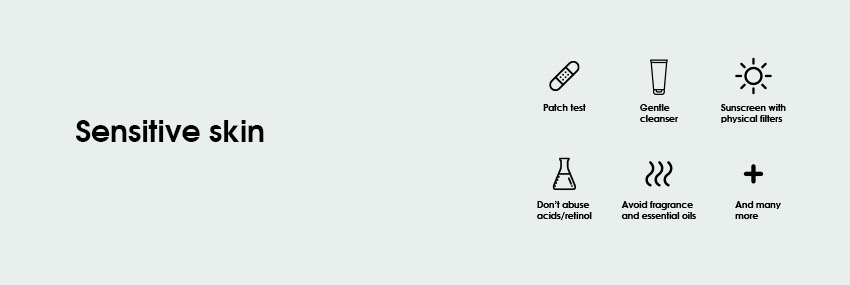Do you have sensitive skin? Does your skin irritate easily and feel itching, flushing, redness…? Taking care of sensitive skin may be difficult and finding the right products to include in your skincare routine can be a pain. With these tips you’ll learn how to take better care of your sensitive skin from now on!
Hello! In this article I am going to talk to you about a topic about which you have asked me very often: how to take care of sensitive skin. I am aware that sensitive skin can be very annoying and problematic, since we often see that certain cosmetics are not recommended for it, but with the tips that I am going to share, you will surely learn to take better care of your sensitive skin.
The topics that I will cover in this post are the following:
1. WHAT IS SENSITIVE SKIN?
I want to start this article by solving a very frequent question: sensitive skin is not a skin type, but a condition of it that is experienced by up to 50% of women and 40% of men. If you still do not know what your skin type is, you can find out in this other article.
Sensitive skin is, as I have mentioned, a skin condition that can happen on a more or less continuous basis. There are those who have sensitive skin constantly and some who experience it occasionally. In the end, each skin is different and we have to know our own to learn how to take proper care of it.
Although more and more studies are trying to find objective causes for sensitive skin that can be empirically measured, there is still a long way to go and, in fact, most cases of sensitive skin are self-diagnosed. It is true that it may seem obvious, you know your skin and you can be aware of whether it is more or less sensitive, but if we have objective tools to find out if your skin is indeed sensitive, you can take better care of it.
Although nowadays there is no single definition to refer to sensitive skin, we can find out if ours is by analyzing if there are a number of common factors. In general, sensitive skin is characterized by the discomfort that we feel when faced with certain stimuli that should not produce these discomforts and that, nevertheless, produce a burning or itching sensation that we usually identify sensitive skin with. Sometimes this sensation occurs along with other visible signs of irritation, such as redness. In addition, sensitive skin is usually accompanied by increased skin dryness.
As I mentioned before, feeling this continuously can be especially annoying, especially when using cosmetics, since there is always the doubt of whether a new product will cause irritation or not.
2. WHAT ARE THE CAUSES OF SENSITIVE SKIN?
The factors that can cause sensitive skin are varied, but I will focus on the most common ones.
Sensitive skin is more common in children and as we age. Babies and children have thinner, more sensitive skin to the world around them, making it more common for them to become irritated. On the other hand, over the years, and as a consequence of skin aging, it is easier for us to experience irritation with products with a higher pH (and which can be disruptive to the slightly acidic pH of our skin).
Keep in mind that the skin clearly reflects some of the changes we go through throughout our lives. Stress, lack of sleep and hormonal changes can make the skin especially sensitive.
On the other hand, there are certain skin conditions that tend to cause greater skin sensitization, such as rosacea, atopic dermatitis and contact dermatitis. In fact, sensitive skin can be considered a symptom of these conditions.
There are studies in which it has not been observed that the skin barrier of people with sensitive skin is damaged, but these studies are not definitive, since no damage in terms of thickness and hydration have been detected but they have not yet been detected analyzed the changes in the molecular structure of the skin when it is sensitive. It is interesting that, in general, there is a trend towards a lower proportion of ceramides in the skin barrier of those who have sensitive skin.
Exposure to environmental stimuli such as the sun, wind, extreme temperatures or pollution tend to cause greater sensitivity to the skin. Our skin is our first barrier against these external elements, so when exposed to them, your skin is the first to suffer from them.
Finally, it must be borne in mind that an incorrect skincare routine can lead to greater skin sensitization. If we do not take proper care of our skin, we do not nourish it, or we abuse acids and other potentially irritating products, we can suffer from sensitive skin.
3. HOW TO TAKE CARE OF SENSITIVE SKIN.
Now that you know some of the most common causes for sensitive skin, you probably want to know what you can do to prevent it and take better care of it. Of course, these are some useful tips, but if you experience irritation or other conditions on an ongoing basis, you should consult your dermatologist for advice on the most suitable treatments for you.
Some changes you can make in your day-to-day to better care for your sensitive skin are these:
- Do a patch test before incorporating any new product into your skincare routine. This way you can know before using this product if it may cause irritation.
- Maintain a basic skincare routine that allows you to take care of your skin by keeping it clean, nourished and protected.
- Use mild, low-pH, skin-friendly cleansers, such as this one from Paula’s Choice.
- Use sunscreens with physical filters. You may find it useful to incorporate one like this one from La Roche Posay into your routines.
- Avoid physical scrubs. As I explain in this other article, these types of exfoliants can unbalance your skin barrier and cause irritation, so it is convenient to stop using them.
- Do not abuse acids. They are very effective ingredients to improve skin tone and texture, but if you don’t use them correctly they can harm your skin.
- Just as you shouldn’t abuse acids, you should use retinoids carefully. They are very powerful ingredients to reduce wrinkles and expression lines, but they also have side effects that can be potentiated on sensitive skin.
- Avoid perfumes and essential oils in the cosmetics you use. They are potentially irritating ingredients and do not add anything useful to these products, so your skin will appreciate leaving them out.
- Avoid alcohol in your cosmetics. It is an ingredient that promotes dehydration of the skin, and dehydrated skin is more easily sensitized skin.
- The ceramides will help you maintain the balance of your skin, avoiding the loss of water. If you use ceramide-rich cosmetics you can keep your skin healthy. A good option is the Paula’s Choice Omega+ Moisturizer, available on Paula’s Choice and on Niche Beauty.
- Coenzyme Q10 has soothing and antioxidant properties, as well as helping to prevent signs of aging on the skin.
- Niacinamide is also a great ingredient for reducing redness. Two good products to introduce into your routines are this one from The Ordinary, available on The Ordinary and this one from Paula’s Choice.
- Maintain a healthy lifestyle, eat healthy, get enough sleep, and try to avoid stress and smoking.
- Avoid showering and washing your face with very hot water.
I hope I have helped you with this article to better understand what sensitive skin is, what causes it, and how you can keep it healthy and cared for.
If you liked this post and want to continue learning to take better care of your skin, I recommend taking a look at these other articles:
Do you want to learn to take better care of your skin? You can see an index of all my informative posts here.● Follow me on Instagram, Facebook, TikTok and Pinterest.
● Share, comment and like my posts on social media.
● Shop through my links to help me keep up with this blog.

I’m Nacho and I’m passionate about skincare. I really enjoy learning and sharing my knowledge about skincare and I read scientific papers so you don’t have to. I want to break stereotypes because I believe skincare has no gender: skin is skin.


